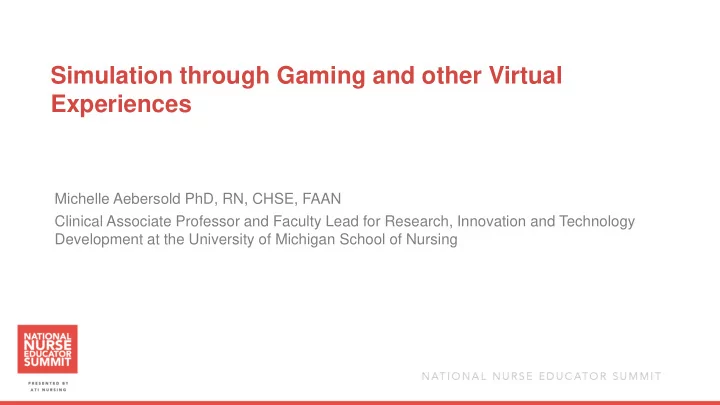

Simulation through Gaming and other Virtual Experiences Michelle Aebersold PhD, RN, CHSE, FAAN Clinical Associate Professor and Faculty Lead for Research, Innovation and Technology Development at the University of Michigan School of Nursing
Digital Natives? Millenials?
What do Students Need?
What Works?
Nursing Education
Zone of Proximal Development (Vygotsky, 1978) Comfort Zone Panic Zone Learning Zone ‘ Safe to feel Uncomfortable ’ Courtesy of Jane Paige
Background What is gaming and virtual experiences? ▪ Virtual Reality- The use of computer technology to create an interactive three- dimensional world in which the objects have a sense of spatial presence ― Simple forms: 3D computer worlds ― Google cardboard, Oculus Go, ― Virtual Patients ▪ Immersive Virtual Reality- ― Oculus Rift ― HTC vive ― CAVE technology 7
Virtual and Augmented Reality https://youtu.be/i4Zt3JZejbg 8
Important Characteristics-Multiuser Immersive Learning Scenarios: Nadolski, Hummel, Slootmaker & van der Vegt (2012) ▪ Experience, exploration, reflection and playful gaming ▪ Authentic tasks to be carried out in inspiring learning environments ▪ Collaboration and communication through role play ▪ Immersion ▪ Active and interactive participation ▪ Personalization and adaptation ▪ Self directed learning ▪ User identity
Learning Benefits Expected from Serious Games Drummond, Hadchouel, & Tsniere-2017
Pillars of Learning Drummond, Hadchouel, & Tsniere-2017
Drummond, Hadchouel, & Tsniere-2017
Examples of Virtual Reality in Education Products ( ▪ Shadow Health ▪ vSim 13
Healthcare Serious Games http://www.ardeaarts.org/birthBeta/
Harvard Educators Resources
Telestrations
Marshmallow Challenge https://www.tomwujec.com/design-projects/marshmallow- challenge/
NASA-Moon Landing
19 Device and Workflow ▪ Microsoft HoloLens was utilized as the AR device. ▪ AprilTag was placed on the head of the mannequin to project the AR facial model. ▪
20 Stroke Simulation ▪ Evaluate student’s ability to recognize the patient was having stroke signs and conduct the FAST stroke assessment. ▪ 85 students divided into groups of 2 or 3 participated in the simulation. ▪ HoloLens had to be worn during the simulation. ▪ An evaluation survey was conducted following each simulation.
Immersive Virtual Reality Pediatric Advanced Life Support 21
https://youtu.be/l0q7nweJ8i8
Mixed Realities in Healthcare Education ▪ https://youtu.be/vS9nnqtmYrI ▪ http://www.etc.cmu.edu/projects/medisim/
360 videos-experiential & empathy https://youtu.be/DgDR_gYk_a8
Questions 25
Recommend
More recommend